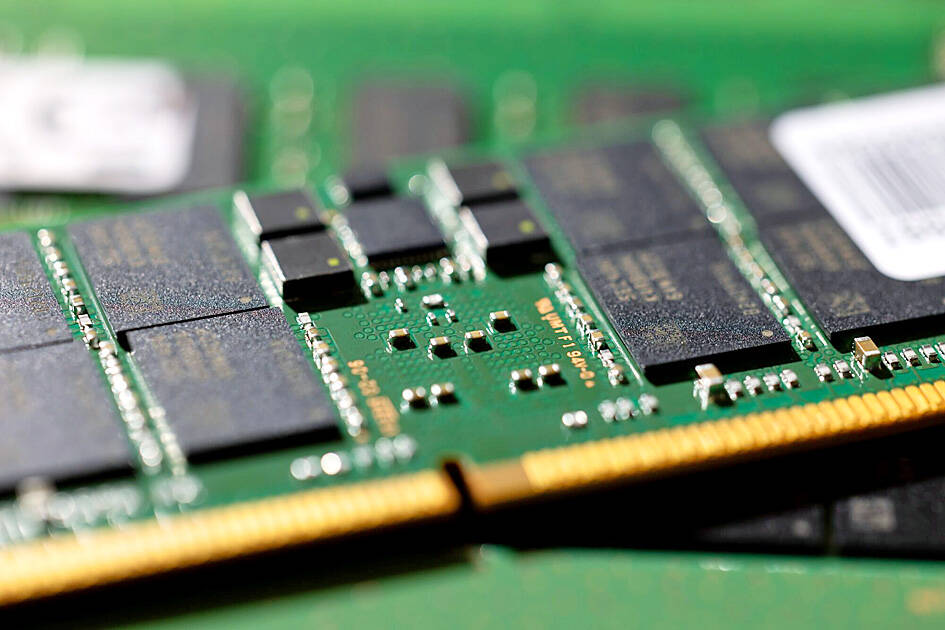South Korea’s export growth continued last month, led by demand for semiconductors, boosting the country’s trade balance to the biggest surplus since 2020 and supporting optimism among policymakers for better-than-expected economic expansion this year.
Shipments that reflect working-day differences increased 9.2 percent from a year earlier, easing from 11.3 percent growth from April, data released by the South’s Korea Customs Service on Saturday said.
Overall imports decreased by 2 percent, while the country’s surplus increased to US$4.96 billion, the largest in 41 months.

Photo: Bloomberg
South Korea has seen gains in the trade balance for a full year, the South Korean Ministry of Trade, Industry and Energy said.
The country’s outbound shipments to China rose 8 percent from a year earlier, while exports to the US increased 15.6 percent, the ministry said.
South Korean industries are having to navigate geopolitical risks stemming from the rivalry between China and the US. China is the nation’s biggest trading partner, while the US provides security guarantees.
The Bank of Korea last month revised its forecast for economic growth sharply higher as export momentum remained robust on the back of demand for products such as semiconductors and automobiles. Chip sales have been particularly healthy, leading gains in overall sales overseas from late last year.
South Korean exports of chips jumped 54.5 percent from a year earlier last month, while those of displays climbed 15.8 percent.
Overseas shipments of solid-state drives used in computers rose 48.4 percent, the ministry said.
While semiconductor exports rose for a seventh month, the pace of increase moderated slightly from 56.1 percent in April.
South Korea and some of its neighbors in Asia occupy positions at the high end of the overall hierarchy of technology supply chains and are set to benefit further from rising demand for electronics needed to advance artificial intelligence and data processing in major economies such as the US.
“Recent data suggest the strength in Asian exports may still have some way to go,” Oxford Economics Ltd economist Sheana Yue (余惠悅) said. “This will, in large part, be due to the chip upcycle.”

SEEKING CLARITY: Washington should not adopt measures that create uncertainties for ‘existing semiconductor investments,’ TSMC said referring to its US$165 billion in the US Taiwan Semiconductor Manufacturing Co (TSMC, 台積電) told the US that any future tariffs on Taiwanese semiconductors could reduce demand for chips and derail its pledge to increase its investment in Arizona. “New import restrictions could jeopardize current US leadership in the competitive technology industry and create uncertainties for many committed semiconductor capital projects in the US, including TSMC Arizona’s significant investment plan in Phoenix,” the chipmaker wrote in a letter to the US Department of Commerce. TSMC issued the warning in response to a solicitation for comments by the department on a possible tariff on semiconductor imports by US President Donald Trump’s

‘FAILED EXPORT CONTROLS’: Jensen Huang said that Washington should maximize the speed of AI diffusion, because not doing so would give competitors an advantage Nvidia Corp cofounder and chief executive officer Jensen Huang (黃仁勳) yesterday criticized the US government’s restrictions on exports of artificial intelligence (AI) chips to China, saying that the policy was a failure and would only spur China to accelerate AI development. The export controls gave China the spirit, motivation and government support to accelerate AI development, Huang told reporters at the Computex trade show in Taipei. The competition in China is already intense, given its strong software capabilities, extensive technology ecosystems and work efficiency, he said. “All in all, the export controls were a failure. The facts would suggest it,” he said. “The US

The government has launched a three-pronged strategy to attract local and international talent, aiming to position Taiwan as a new global hub following Nvidia Corp’s announcement that it has chosen Taipei as the site of its Taiwan headquarters. Nvidia cofounder and CEO Jensen Huang (黃仁勳) on Monday last week announced during his keynote speech at the Computex trade show in Taipei that the Nvidia Constellation, the company’s planned Taiwan headquarters, would be located in the Beitou-Shilin Technology Park (北投士林科技園區) in Taipei. Huang’s decision to establish a base in Taiwan is “primarily due to Taiwan’s talent pool and its strength in the semiconductor

French President Emmanuel Macron has expressed gratitude to Hon Hai Precision Industry Co (鴻海精密) for its plan to invest approximately 250 million euros (US$278 million) in a joint venture in France focused on the semiconductor and space industries. On his official X account on Tuesday, Macron thanked Hon Hai, also known globally as Foxconn Technology Group (富士康科技集團), for its investment projects announced at Choose France, a flagship economic summit held on Monday to attract foreign investment. In the post, Macron included a GIF displaying the national flag of the Republic of China (Taiwan), as he did for other foreign investors, including China-based